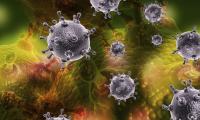Seven research institutions receive DKK 20 million for coronavirus research

The Lundbeck Foundation has allocated the first DKK 20 million of its coronavirus fund to ten research projects. Among other things, the projects will:
– investigate whether various drug therapies could have an effect on COVID-19
– investigate the psychiatric consequences of COVID-19
– observe trends in the concerns of the Danish public and Danes’ propensity to follow the recommendations of the authorities
– design a virtual reality education programme for emergency in-service training of healthcare staff
Just a week ago, the Lundbeck Foundation gave researchers an option to apply for funding for research projects targeting the COVID-19 pandemic, earmarking a total of DKK 30 million for the purpose. And we have already shared out the first DKK 20 million.
‘Applications have poured in. Among them are many exciting and extremely qualified projects, some of which – if they’re successful – could have an effect on COVID-19 in the short term. We expect to have allocated the fund’s last DKK 10 million by the end of this week, and we’ll then close the call for applications,’ says Jan Egebjerg, Director of Research at the Lundbeck Foundation.
Hvidovre Hospital – DKK 5,000,000
CREDID COVID-19 ADAPTIVE PLATFORM – RANDOMISED CLINICAL TRIALS
It will probably take years to develop an actual vaccine for the COVID-19 virus. A research group at Hvidovre Hospital will therefore investigate whether well-known drugs such as hydroxychloroquine, plasma from people who have recovered from the virus, IL-6 antagonists and baricitinib could have a positive effect on adults with COVID-19 pneumonia.
Odense University Hospital – DKK 1,887,940
PREVENTION OF COVID-19 AMONG RETIREMENT HOME RESIDENTS – A RANDOMISED CLINICAL TRIAL
Researchers from Odense University Hospital will investigate the potential for preventing the disease from developing in society’s most vulnerable – retirement home residents. The researchers will seek to identify whether hydroxychloroquine and dietary supplements reduce the risk of coronavirus infection, severity of pathogenesis and the subsequent risk of admission to hospital or death. 206 people over the age of 65, who live in the Danish municipalities of Odense, Svendborg or Kerteminde, are participating in the trial.
University of Copenhagen
NEUROLOGICAL AND PSYCHIATRIC COMPLICATIONS OF COVID-19: PREVALENCE AND DISEASE MECHANISMS, DKK 1,000,000
The research team will investigate the neurological and psychiatric complications of COVID-19. Experience from previous pandemics such as the Spanish Flu shows that they often usher in a wave of psychiatric disorders. The researchers aim to map the neurological and psychiatric complications. The grant covers expenses for examination of patients and collection of samples of spinal fluid for further analysis.
THE ACUTE IMMUNE RESPONSE IN THE LUNGS OF PATIENTS IN CRITICAL CONDITIONS DUE TO SARS-COV-2 INFECTION, DKK 800,000
The group of researchers will investigate how our lungs’ own immune system reacts to COVID-19. The virus can cause severe inflammation of the lungs with subsequent pulmonary damage. However, because this virus is new, we as yet know very little about its impact on the lungs. The researchers will extract fluid from the lungs of severely ill patients in ICUs, and will characterise immune cells and neurotransmitters.
COVID-19 SNAPSHOT MONITORING (COSMO) IN DENMARK AND BEYOND – DKK 500,000
The research team will analyse Danes’ perception of the coronavirus pandemic and the impact this has on the way they act. By means of a weekly questionnaire, the researchers will observe the trend in the population’s fear of the virus and study the degree to which Danes follow the recommendations of the authorities. The project is part of a WHO study to draw comparisons between countries.
EVIDENCE-BASED EDUCATION OF HEALTHCARE PROFESSIONALS IN HANDLING THE COVID 19 PANDEMIC – DKK 500,000
The group from the University of Copenhagen will investigate how best to provide emergency training for healthcare staff from other specialist fields in order to prevent a shortage of qualified staff to care for the many patients expected to require respirator support. Among other things, the researchers will develop a virtual reality, simulation-based training programme.
Statens Serum Institut – DKK 429,500
THE RISK OF COVID-19 IN PATIENTS WITH IMMUNE MEDIATED INFLAMMATORY DISEASES
A range of disorders such as rheumatoid arthritis, psoriasis, colitis and Crone’s disease develop when the immune system overreacts and begins to attack the body. It is unknown whether patients suffering from such diseases are particularly at risk of becoming seriously ill if they are given Covid19. A team of researchers at the Danish serum institute, SSI, will therefore investigate their risk and the impact of the medicine they are already taking on the course of COVID-19 in these patients.
Rigshospitalet, University of Copenhagen – DKK 500,000
COVID-19 IN RHEUMATOID ARTHRITIS PATIENTS IN IMMUNOSUPPRESSIVE THERAPIES
This study will investigate whether arthritis patients are at particularly high risk of developing life-threatening complications if they contract COVID-19. A group of arthritis specialists at Rigshospitalet, University of Copenhagen, will therefore study the admission frequency and death rate of arthritis patients as well as the impact of treatment with immunosuppressants on the course of the disease.
Aarhus University Hospital and Aarhus University – DKK 4,990,000
THE IMPACT OF CAMOSTAT MESILATE ON COVID-19: A RANDOMISED, PLACEBO-CONTROLLED TRIAL
The researchers will investigate whether a known Japanese heartburn drug could slow down COVID-19 by reducing the spread of SARS-CoV-2 in the body. The drug has previously been proven to have an effect on SARS, which shares certain similarities with the new coronavirus, in mice. 180 patients in Danish hospitals will participate in the trial.
Bispebjerg Hospital – DKK 3,919,000
INTERLEUKIN-6 RECEPTOR INHIBITORS IN THE MANAGEMENT OF PATIENTS WITH SEVERE SARS-COV-2 PNEUMONIA
Data from China indicate that a known anti-rheumatism drug may have an inhibitory effect on the inflammation that damages patients’ lungs when they contract COVID-19. In a controlled, randomised trial, the researchers at Bispebjerg Hospital will investigate whether the assumptions about the beneficial effect of this drug hold water.
For further details please contact:
Jan Egebjerg, Director of Research at the Lundbeck Foundation, tel. +45 2119 3713
Pernille Thorborg Jasper, Media Relations Manager at the Lundbeck Foundation, tel. +45 2118 9132


